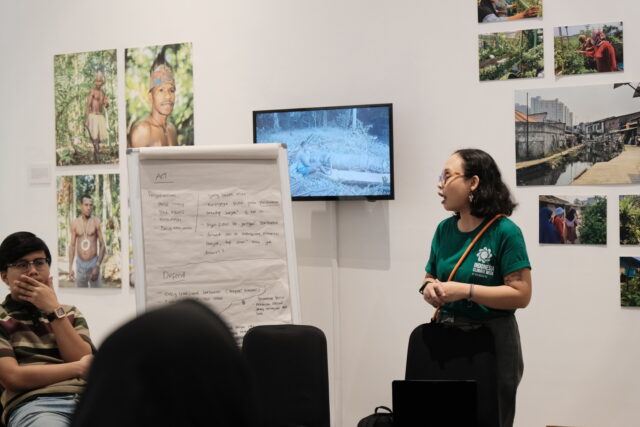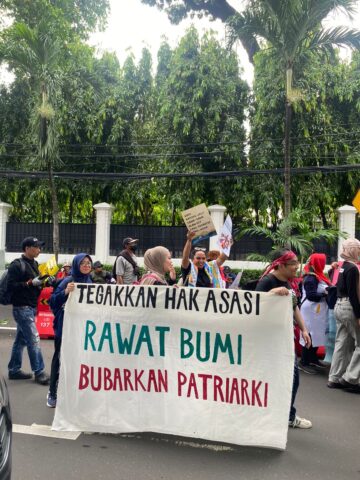
Civic Rights in A Digital Age (CRIDA) | January 21, 2025
We Don’t Live in Different Planets: Thoughts on Civic Space and Climate Activism
Nisrina Nadhifah Rahman
Climate justice extends beyond ecological and environmental challenges; it is deeply intertwined with civil liberties. Safeguarding inclusive and protected civil liberties ensures that individuals and communities have the freedom to voice critical concerns, advocate for climate action, protect the environment, and demand justice.
As part of the Indonesian Climate Week events organized by the Indonesia VCA Alliance (Aliansi VCA Indonesia) on December 14, 2024, one of the latest Humanist initiatives, Connect, Defend, Act! (CDA), hosted a discussion titled “We Don’t Live in Different Planets: Thoughts on Civic Space and Climate Activism.” This dialogue, attended by 11 participants, focused on climate activism, the role of civil society, and government involvement in climate advocacy efforts in Indonesia.
The discussion highlighted the interconnectedness of the climate crisis and human rights, framing the issue within the climate justice lens. This perspective emphasizes the disproportionate impacts of climate change on marginalized communities. For instance, women in developing countries face unique vulnerabilities, such as women fisherfolk in coastal areas. Not only responsible for catching seafood, but they are also often tasked to manage the aftermath of tidal floods while still not legally recognized as fisherfolk. Similarly, other vulnerable groups—including indigenous peoples, gender and sexual diverse groups, and people with disabilities—are also disproportionately affected by the climate crisis.
Through the lens of climate justice, the roles of marginalized groups are no longer undervalued or excluded from the climate crisis conversation. Climate justice goes beyond reducing carbon emissions—it emphasizes the importance of integrating human rights, gender equality, and diversity into climate policies that are inclusive and sensitive to the adaptive capacities of affected communities.

Participants stressed the importance of greater, more meaningful involvement of young people in civil society, particularly within Civil Society Organizations (CSOs). Although the topic has been frequently discussed over the past decade, their participation remains not meaningful, not because of them exactly but because they are often excluded from the decision-making process by the senior figures. This dynamic overlooks the significant contributions of young climate activists, who have demonstrated exceptional skill in building cross-sectoral solidarity through various campaigns that integrate human rights, women’s rights, indigenous peoples’ rights, and land grabbing into the broader framework of climate justice.
The discussion then shifted to the need to collaborate with the government. Some participants supported minimal involvement, focusing on keeping the government informed, while for others, collaboration with local government is essential as the local government is often more respected and trusted by community groups. Conversely, many participants expressed skepticism about working with the national government, perceiving such collaboration as largely ineffective and frequently reduced to mere “lip service,” with few consistent or people-centered outcomes—particularly amidst extractives’ government policies on climate and the environment.
Building connections and bridges between communities is also a hot topic. Participants regarded collective efforts as strengthening advocacy and ensuring a sustainable social movement. One initiative highlighted during the discussion was connecting groups of local women leaders across different regions, enabling them to share their experiences of challenging patriarchy within the unique contexts of their respective struggles.

Showcasing the success stories of local groups in defending their rights, adapting to challenges, and strengthening grassroots movements emerged as a key driver for sustaining the momentum of the struggle beyond isolated moments of action. Toward the conclusion of the discussion, participants underscored the importance of fortifying civil society’s networks and supporting the sustainability of local communities.
A bottom-up approach, where local movements lead by example, was deemed more effective than national strategies that often lack contextual relevance. Long-term care work, mentoring, and capacity building remain undervalued despite being crucial for sustaining movements, empowering diverse groups, and co-creating solutions tailored to specific needs and contexts.
The discussions at “We Don’t Live in Different Planets: Thoughts on Civic Space and Climate Activism” align closely with the findings of Humanis own Connect, Defend, Act! (CDA) Baseline Study. The study revealed that, on average, climate activism tends to focus on ‘points of destruction’[1]—such as villages, farmlands, and forests—where resistance against land grabbing and environmental exploitation is most frequent. Activism efforts often face significant structural challenges, including government policies that promote extractivism and the shrinking of civic space through physical attacks, judicial harassment, and digital intimidation.
To counter these trends, strategies such as building the capacity of local communities, supporting grassroots initiatives, and weaving cross-sector alliances should become our priorities. These approaches are not only beneficial to empower civil society to defend ecological spaces but also sustaining solidarity for climate advocacy in the long run.

The interconnectedness of civic space and climate activism calls for an approach rooted in an ethic of care, solidarity across regions, and the integration of local and global perspectives. These are the keys to counter environmental exploitation, amplifying the voices of local communities, and expanding the impact of the climate movement on a broader scale.
‘Refuse to be diminished; instead, multiply’ echoed throughout the discussion, with the hope that it continues to inspire civil society and activists to take a stand and fight for a world where everyone is safe from the impacts of climate crisis.
***
Baseline Study Connect, Defend, Act! (CDA) can be accessed through: https://humanis.foundation/publication/adu-jitu-melawan-otokrat/ (Bahasa Indonesia) and https://humanis.foundation/publication/outsmarting-and-outlasting-autocratic-actors/ (English)
[1] Points of Intervention is a conceptual framework from Nonviolence Studies that identifies key areas within a system that can be strategically targeted to disrupt or disable an opponent. These points include production points, destruction points, consumption points, decision points, assumption points, and opportunity points (Reinsborough & Canning, 2017).

